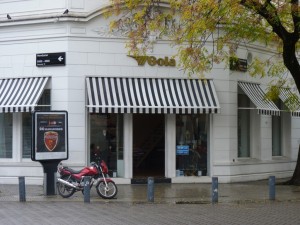Argentina has been tricky to deal with lately for exporters from all over the world. Strong protectionist policies mixed with internal instability have set high barriers to trade for those wanting to do business with South America’s second largest economy. Mercosur (the trading bloc Argentina is part of together with countries like Brazil and Uruguay) is said to be closer than ever to an FTA (Free Trade Agreement) with the European Union but Argentina doesn’t seem to be too keen on it.

Some British brands are making it into Argentina.
So should you abandon all hope of exporting to Argentina?
Those exporters that keep a close eye on South America often ask me what the view is from down here, only three months away from the presidential election. Will things really change after this election? Will a change of government reverse the protectionist policies that Mrs Fernández & co. where so keen to promote?
I ask those questions myself, not only because I work with British and other exporters but because I live pretty close to Argentina, in Uruguay, and everything that happens next door affects us here. So today I was very keen to attend a seminar by Argentine economist Salvador Di Stefano and hear what we can expect from Argentina. Here are some of the lessons:
– Di Stefano joked that Argentina is great at recovering from crises. And for falling back into them, too. Basically, expect instability. That’s Argentina. In my opinion, it’s a country that needs a long-term view, patience and a good cash-flow. If you combine this with corruption, you will know that it’s not a market for beginners.
– The two strongest presidential candidates (Macri and Scioli) are both business people (from Argentina’s elite) so there is hope for a more business-friendly environment.
– Either of the two main parties could win this election. However, some factors that Di Stefano discussed made us think that there is more of a chance of continuity, of the same party governing again.
– In terms of timing, I perceive that things are getting rather animated right now and uncertainty is strong, so you will find that some business decisions will be postponed until after the elections of October 25th (from my experience, business people will listen to your proposition but might hold back on making decisions or taking high risks right now). Di Stefano reminded us that if there is no winner on 25th October, there will be a second round on 24th November, with the new government in place from 10th December. That’s the holiday/summer season in South America, so basically no decisions will be taken until the new year (after 6th January, Epiphany) and possibly until March. That’s a good 100 days of uncertainty and you will definitely feel that things will slow down.
However, to me the greatest lesson from Di Stefano’s talk was in the form of what’s going to happen to the exchange rate in Argentina. According to the economist, Argentina will go from an exchange rate of 10.5 to an exchange rate of 24.7. That means that, if these forecasts are correct, your importer, currently paying 10.5 pesos for each dollar to pay for your goods/services, will have to pay 24.7 in 2017. That makes the situation rather difficult for exporters from all over the world (with the pound sterling strengthening at the moment, I can see that as a huge issue for UK exporters). I asked Di Stefano at the end of the talk about the chances of Argentina’s protectionist policies weakening after the election, and he’s confident that they will. But the barrier to trade will cease to be the import licences, regulations and blocks, they will now be in the form of devaluation. Not a happy ending at all.

Can you please tell if it’s possible to sell goods to Argentina from Urugıay as import tax free if we import and stock our goods to Uruguay in advance?
Thanks.
Hi. This is something we get asked often. Under Mercosur, it is possible in most cases to pay import duties when your goods enter Uruguay and then not pay when they get shipped to Argentina. You obviously have to pay import duties at some stage! What might be of benefit is to consider benefiting from Uruguay’s free trade zones. So you don’t pay import duties to get your products into Uruguay’s free trade zones. You can hold stock there free of duty. You only pay your duty when the stock leaves the free trade zone and enters Argentina (or whatever country). That could be very useful from a tax, logistics and/or stock perspective.